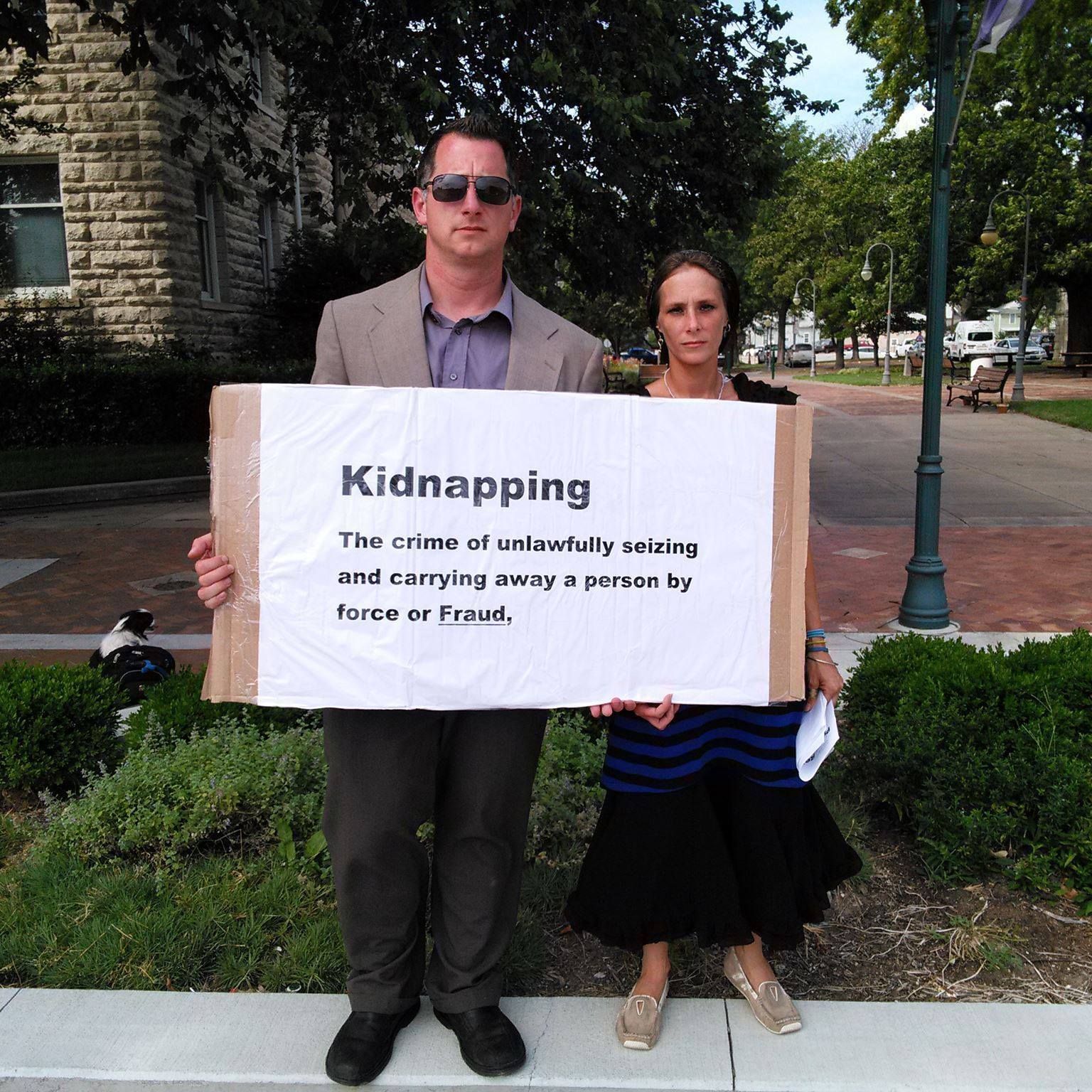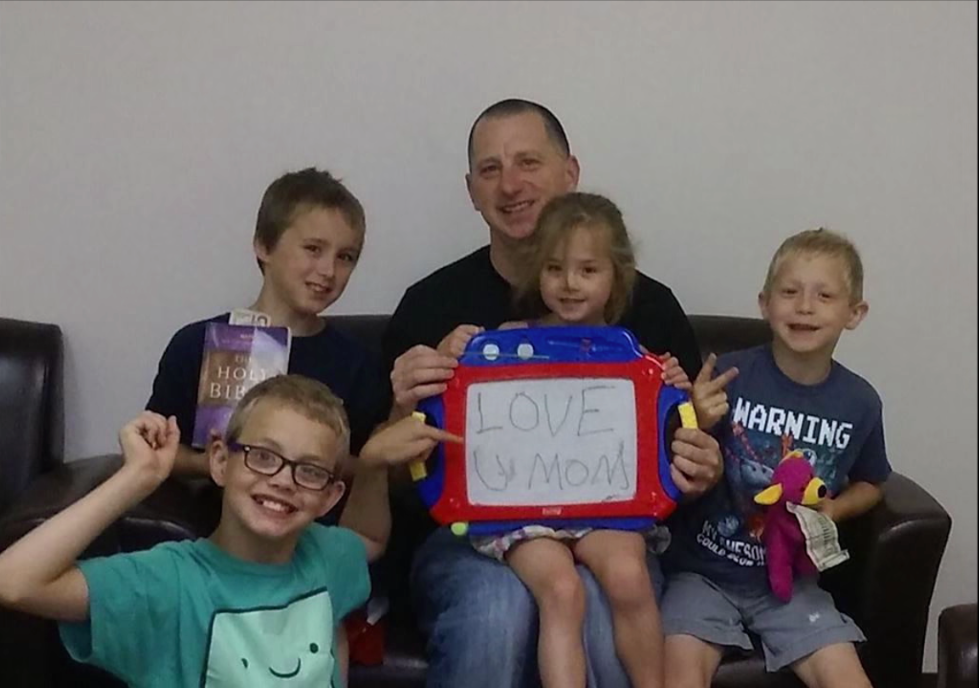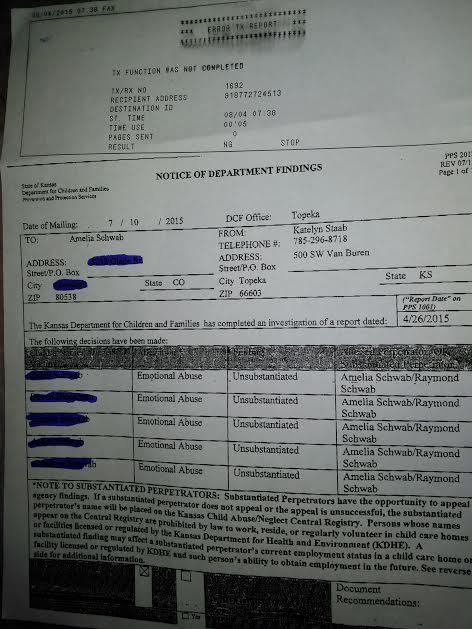Kansas Takes Custody of Children of Colorado Medical Marijuana Patients

By:
Raymond and Amelia Schwab have accused the state of Kansas of "kidnapping" five of their six children in a custody battle that has become primarily about medical marijuana.
 Facebook/Raymond and Amelia Schwab - facebook.com
Facebook/Raymond and Amelia Schwab - facebook.com
For the past nine months, the Schwab kids — aged five to sixteen years old — have been placed in the state's child protective services, despite the fact that all allegations against the parents were found to be unsubstantiated by the Kansas Department for Children and Families. That's because the court has focused on the Schwab's admitted use of medical marijuana, which is illegal in Kansas but not in Colorado, where they raised their kids until 2013 when Raymond got a job at the Veterans Affairs office in Topeka, Kansas.
RELATED: 11 Things Colorado Can Now Fund Thanks to Legal Marijuana
Last summer, a family dispute led one relative to report the children abandoned to the Riley County Police Department in Manhattan, Kansas, which allegedly put the children into emergency custody without contacting the Schwabs. The relative had been watching them for a few days as the parents packed up the rest of the house; they were moving back to Colorado after Raymond was able to transfer to the V.A. in Denver. The Schwabs say that the relative regrets the action and that they've since reconciled. The state of Kansas, meanwhile, has not let up.
 Facebook/Raymond and Amelia Schwab - facebook.com
Facebook/Raymond and Amelia Schwab - facebook.com
"They can try to say this was about other issues, but it was, from the beginning, them saying, 'They're going out to Colorado to start a dispensary, we don't want these kids going out there, they're in danger, take them," Schwab told ATTN:. "And they did. They broke Kansas law and took our kids."
Raymond is a 40-year-old disabled veteran who served during the Gulf War era. He was diagnosed with PTSD and chronic pain. Amelia has rheumatoid arthritis and spinal stenosis, painful conditions that often leave her bedridden. Both received recommendations for medical marijuana from a licensed physician in Colorado, where the substance is now legal for recreational and medical purposes. And both say that the plant has dramatically improved their quality of life, especially for Amelia, who is allergic to prescription painkillers.
But Kansas does not recognize marijuana's medical value and has required the Schwabs to submit to psychological testing, parenting classes, drug tests, and to give up cannabis — in spite of the fact that they're Colorado residents — in order to reclaim custody of their kids. They did just that, Raymond told me over the phone, but it wasn't enough.
 Facebook/Raymond and Amelia Schwab - facebook.com
Facebook/Raymond and Amelia Schwab - facebook.com
Having stopped using medical marijuana, Raymond went back to taking a cocktail of painkillers, muscle relaxants, and anti-anxiety drugs to treat his health conditions. Still, the Schwabs were not granted custody, and the legal battle waged on, with the court increasingly focused on the medical marijuana issue. The case is currently under review by the Kansas Court of Appeals.
 Raymond and Amelia Schwab - gofundme.com
Raymond and Amelia Schwab - gofundme.com
In many ways, the child custody case represents the troubling consequences of conflicts between state drug laws. This is by no means the first time that the stigmatization and criminalization of marijuana has torn families apart; parents across the country have had their children taken away from them by protective services due to marijuana-related offenses. What's unique about this case, however, is that the legal battle over the parents' legal use of medical marijuana in Colorado is taking place in Kansas.
"I felt trapped," Raymond said. "You guys are forcing me to choose between my health, my wife's health, or my children. That's just evil."
The Schwabs launched a GoFundMe campaign recently to raise money for their legal fund. They plan to file a federal lawsuit against the state of Kansas, the Kansas Department for Children and Families, the Riley County Police Department, and the Prosecutor's Office.
"I want to sue them and utilize those funds to continue to help parents and families," Raymond told ATTN:. "We were starting our own care giving organization here so I could work with veterans and start making cannabis oil so we could start getting medicine to people, and we've kind of put a hold on all of that because of what's going on."
"But it's not going to be over once I get my kids back. I'm going to make sure that we do everything we can to get reforms put in place so that this can't happen to other families," he added.
RELATED: Guess What? Drug Tests Are A Massive Scam
ATTN: reached out to the Kansas Department for Children and Families and the Riley County Police Department for comment, but representatives could not be reached by phone or email by the time of publication.
Here's an excerpt from my interview with Raymond Schwab.
ATTN: Can you describe the kind of constitutional violations you believe are involved in this case?
RS: One is that they kidnapped my children. They took them into custody contrary to law. We didn't have a hearing for 18 days. They had a secret hearing without us, put my kids into state custody, and then put in a motion to redo it and waited 18 days. You're supposed to have a hearing within 72 hours.
They've stopped all contact with our children multiple times even though their own investigation resulted in findings that the allegations were unsubstantiated against us. It's obviously unconstitutional that the judge is trying to make medical decisions for my family.
 Raymond Schwab
Raymond Schwab
ATTN: How has medical marijuana affected your quality of life?
It's helped where I didn't have to use narcotic painkillers. You can ask my wife that question, I would think she would say that it's improved her quality of life because, as she said to the Denver Post, when I'm on those drugs — you can't see it when you're on them, you think you're doing fine — but you know, the benzos and stuff, they make you really angry, you're sleeping all the time, trouble going to work, agitation — I'd just blow up sometimes.
Not only that, I don't really take a lot [of cannabis]. People keep saying things like, "You just want to smoke marijuana." I don't even smoke. I make my own cannabis butter, and I take it twice a day, just like I would medication. I don't have to take narcotics anymore. I don't need to take benzos anymore. I can function. I can go workout with my older son. I mean, it's totally increased my quality of life besides the fact that they're trying to make me go crazy by what they're doing to my kids.
ATTN: If the Kansas Department for Children and Families has found all allegations against you unsubstantiated, why has this case dragged on for nine months?
Kansas made this about us coming here for cannabis. Every court hearing is about that now. It's not about the initial allegations because all of those were unsubstantiated, it's about "You will stop using cannabis," and me fighting them on that, saying, "You don't have a right to say that. You're pushing me into an arena that could be harmful."
And my wife is a patient as well, so it's legit on both of our ends. And even if it wasn't, it doesn't matter. This is Colorado. But the fact of the matter is, for the sake of Kansans and their mind not being able to understand how far this medical therapy has advanced... We're just giving them as many facts as we can about the medical aspects, but even if they said, "We're trying to do that to somebody was recreationally using," it's not illegal [in Colorado].
